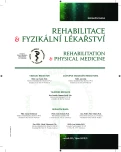Cultural and Philosophical Differences in Europe are Reflected in Rehabilitation Therapy (Physiotherapy) of Neurological Patients II
Authors:
K. Řasová 1; A. Hogenová 2
Authors‘ workplace:
Klinika rehabilitačního lékařství 3. LF UK a FNKV, Praha
přednostka doc. MUDr. D. Jandová
1; Pedagogická fakulta Univerzity Karlovy, Praha
2
Published in:
Rehabil. fyz. Lék., 20, 2013, No. 3, pp. 168-172.
Category:
Discussion
(Reakce na článek)
Overview
In the following article, we respond to feedback from colleagues Ivan Vařek and Radmil Dvořák and present a comparison of Continental and Anglo-Saxon world views and their influence on rehabilitation and physiotherapy in Europe in greater detail.
Keywords:
physiotherapy, facilitation, examination, philosophy, Anglo-Saxon and Continental way of thinking
Sources
1. Aristotelés: Fyzika. Antonín Kříž (překlad), Praha, Petr Rezek, 2010. 365 s., ISBN: 978-80-86027-31-9.
2. DAVIES, P. M.: Steps to follow. A guide to the treatment of adult hemiplegia. Based on the Concept of K. and B. Bobath. Springer-Verlag, Berlin, 1993, s. 8-23.
3. Hogenová, A.: Areté, základ olympijské filosofie. Karolinum, Praha, 2000.
4. http://csmithm.blogspot.cz/2011/05/generalized-motor-program.html
5. http://flashcarddb.com/cardset/253667-motor-control-bernstein-flashcards
6. Husserl, E.: Ideen zu einer reinen Phänomenologie und phänomenologischen Philosophie 5. I. Haag, Martinus Nijhoff, 1950.
7. Ingthorsson, R.: Does neurophenomenological methodology need to make some kind of "epojé" concerning the thesis of the theoretical charge of the observational data? Research Gate, 2012.
8. LeVasseur, J. J.: The Problem of Bracketing in Phenomenology. Qualitative Health Research, 13, 2003, 3, s. 408-420, DOI: 10.1177/1049732302250337.
9. McInerney, R. G., Walker M. M.: Toward a method of neurophenomenological assessment and intervention. The Humanistic Psychologist, 30, 2002, s. 180-193.
10. Popper, K. R.: Logika vědeckého zkoumání. Praha, Oikumene, 1997.
11. Prigogine, I., Stengers I.: Order out of chaos: Man's new dialogue with nature. Flamingo, 1984, ISBN 0-00-654115-1.
12. Rudrauf, D. A., Lutz, D., Cosmelli, J.-P., Lachaux, M., Le Van Quyen: "From autopoiesis to neurophenomenology: Francisco Varela's exploration of the biophysics of being". Biol. Res., 36, 2003, s. 21-59.
13. ŘASOVÁ, K.: Fyzioterapie u neurologicky nemocných (se zaměřením na roztroušenou mozkomíšní sklerózu). Ceros, o.p.s., Praha, 2007.
14. Řasová, K., Hogenová, A.: Kulturní a filozofické rozdíly v Evropě se odrážejí v rehabilitační léčbě (fyzioterapii) neurologicky nemocných. Rehabilitace a fyzikální lékařství, roč. 19, 2012, č. 1, s. 47-49, ISSN: 1211-2658.
15. Varela, F.: Neurophenomenology: A methodological remedy for the hard problem. Journal of Consciousness Studies, 1996, č. 3, s. 330-349.
16. Vařeka, I., Dvořák, R.: Reakce na článek: Kulturní a filozofické rozdíly v Evropě se odrážejí v rehabilitační léčbě (fyzioterapii) neurologicky nemocných – Řasová K., Hogenová A., č.1/2012. Rehabilitace a fyzikální lékařství, 2012, 3, s. 149-150.
17. Véle, F.: Kineziologie pro klinickou praxi. Grada, Praha, 1997.
18. http://www.vojta.com/index.php?option=com_content &view=article&id=2&Itemid=9&lang=cs
Labels
Physiotherapist, university degree Rehabilitation Sports medicineArticle was published in
Rehabilitation & Physical Medicine

2013 Issue 3
- Hope Awakens with Early Diagnosis of Parkinson's Disease Based on Skin Odor
- Deep stimulation of the globus pallidus improved clinical symptoms in a patient with refractory parkinsonism and genetic mutation
-
All articles in this issue
- Model of Chronic Back Pain Management Therapy in Pain Therapy Centers
- Work Rehabilitation – Method of the Isernhagen Work System (IWS)
- Cultural and Philosophical Differences in Europe are Reflected in Rehabilitation Therapy (Physiotherapy) of Neurological Patients II
- Effect of Cardiac Rehabilitation in Spa in Patients after Coronary Artery Bypass Graft Surgery to the Indices of Heart Rate Variability
- Possibilities of Using Active Video Games in Rehabilitation
- The Use of Accelerometer in Rehabilitation of Patients after Brain Damage
- Training of Knee Joint Rehabilitation Using the TRX Suspension Trainer
- The Influence of Robot–assisted Training on Motor Functions of the Patients with Children Palsy in Relation to the Severity of the Defects
- Rehabilitation & Physical Medicine
- Journal archive
- Current issue
- About the journal
Most read in this issue
- Training of Knee Joint Rehabilitation Using the TRX Suspension Trainer
- Model of Chronic Back Pain Management Therapy in Pain Therapy Centers
- Work Rehabilitation – Method of the Isernhagen Work System (IWS)
- Possibilities of Using Active Video Games in Rehabilitation
